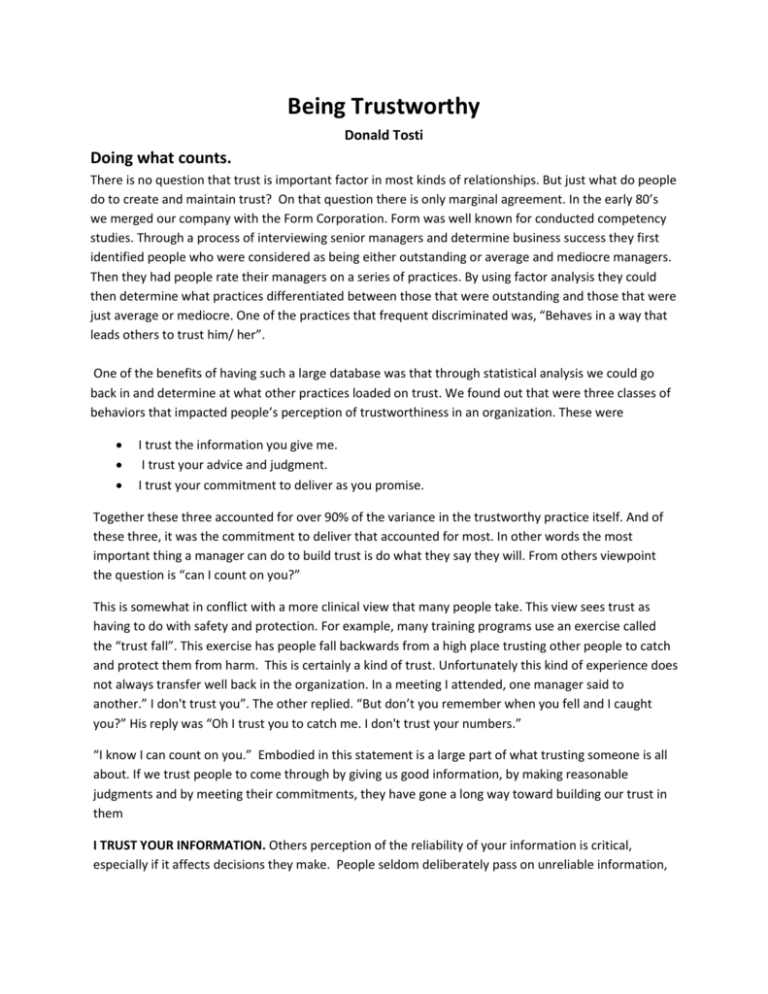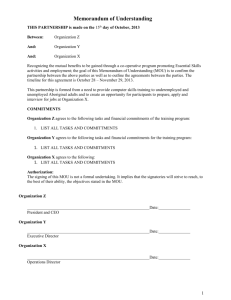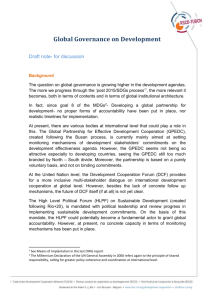Being_Trusted
advertisement

Being Trustworthy Donald Tosti Doing what counts. There is no question that trust is important factor in most kinds of relationships. But just what do people do to create and maintain trust? On that question there is only marginal agreement. In the early 80’s we merged our company with the Form Corporation. Form was well known for conducted competency studies. Through a process of interviewing senior managers and determine business success they first identified people who were considered as being either outstanding or average and mediocre managers. Then they had people rate their managers on a series of practices. By using factor analysis they could then determine what practices differentiated between those that were outstanding and those that were just average or mediocre. One of the practices that frequent discriminated was, “Behaves in a way that leads others to trust him/ her”. One of the benefits of having such a large database was that through statistical analysis we could go back in and determine at what other practices loaded on trust. We found out that were three classes of behaviors that impacted people’s perception of trustworthiness in an organization. These were I trust the information you give me. I trust your advice and judgment. I trust your commitment to deliver as you promise. Together these three accounted for over 90% of the variance in the trustworthy practice itself. And of these three, it was the commitment to deliver that accounted for most. In other words the most important thing a manager can do to build trust is do what they say they will. From others viewpoint the question is “can I count on you?” This is somewhat in conflict with a more clinical view that many people take. This view sees trust as having to do with safety and protection. For example, many training programs use an exercise called the “trust fall”. This exercise has people fall backwards from a high place trusting other people to catch and protect them from harm. This is certainly a kind of trust. Unfortunately this kind of experience does not always transfer well back in the organization. In a meeting I attended, one manager said to another.” I don't trust you”. The other replied. “But don’t you remember when you fell and I caught you?” His reply was “Oh I trust you to catch me. I don't trust your numbers.” “I know I can count on you.” Embodied in this statement is a large part of what trusting someone is all about. If we trust people to come through by giving us good information, by making reasonable judgments and by meeting their commitments, they have gone a long way toward building our trust in them I TRUST YOUR INFORMATION. Others perception of the reliability of your information is critical, especially if it affects decisions they make. People seldom deliberately pass on unreliable information, with intent to deceive. More often, unreliable information is a result of carelessness or failure to see the other’s point of view. Below are some of the issues to consider in deciding whether the information you provide to others is reliable—and will be perceived as reliable by others. Is it accurate and complete? One way to create distrust is to be seen as a gossip. People who consistently gossip are usually not trusted for two reasons: first, they frequently pass on information of questionable accuracy; and second, they generally cannot be counted on to maintain a confidence. Passing on partial information can also affect your reliability. Even though the information is accurate, its incompleteness may mislead people – and cause distrust when they learn the parts you left out. Good tactics to use are these: When you’re about to pass on information, make sure you tell people everything that is relevant. When you’re about to pass on speculation, let people know it is speculation. When you’re about to pass on gossip, stop. Do you have hidden motives? One way to erode trust is to appear to have hidden motives. Being selective in what one passes on may bring a temporary advantage. But most people eventually recognize this and credibility can suffer badly if others see someone as withholding or distorting information for their own benefit. There’s nothing wrong with having your own motives; nor is there any reason you shouldn’t benefit from the information you pass on. But when this is the case, it is important to make your motives known beforehand to prevent mistrust later. Are you knowledgeable? If you are not knowledgeable of a particular situation, it’s important not to fall into the trap of thinking that you must tell people something. A simple “I know” seldom damages credibility, and often enhances it. What is its accuracy? Before providing information to others, make sure your sources are accurate. Test them, if necessary, to be sure that the information you relay is correct. Let people know if you have suspicions about the accuracy of your source. It has been said that “information never organizes itself.” We typically interpret information, as we present it, and that interpretation biases the way people perceive it. If this bias becomes excessive, people begin to question our objectivity. I TRUST YOUR ADVICE AND JUDGMENT In practice, no one’s decisions are always successful, and no reasonable person expects them to be. In fact, anyone whose decisions are always correct is probably not doing a good job, because it would indicate unwillingness to take any kind of risk. What we usually expect from those we trust is that they make decisions that appear reasonable, given the circumstances. Below are some of the factors that enter into people’s perception of the reliability of another’s judgment. Clarity of the decision-making process: If decisions seem “well thought out,” they create an impression of reliability. This means that for people to trust our judgment they may need to know something about how we arrive at decisions. Often, decisions are announced with very little of the thinking that went into them. This can breed distrust if the decisions appear arbitrary to those not involved in them. It can be extremely important, therefore – especially in times of uncertainty – that announcements of decisions made at higher levels be accompanied with reasons behind the decisions and the criteria on which they were based. Vacillation: The appearance of uncertainty influences others’ trust in our judgments. If a person seems to move back and forth between positions, first making a decision and then reversing it, how can one have confidence in the decisions? The key to avoiding the appearance of vacillation is to tie one’s decisions to information. If you change your position, be able to cite information or reasoning that led you to do so. I TRUST YOU WILL DELIVER ON YOUR PROMISE Below are some of the key factors that affect others’ view of your reliability of delivery. Keeping Commitments: A saying that originated among 19th century merchants was “My word is my bond.” This implies a one to one correspondence between what we say and what we do. When we create that link, we build a strong bond of trust. Even bitter enemies in war, politics and business sometimes develop strong mutual trust because they can count on the other to deliver what they commit to. Keeping one’s commitments is one of the most important factors in building trust. Few of us deliberately intend to violate commitments. More often we find ourselves “caught” despite good intentions. Below are some practices and tactics for avoiding situations that erode trust in our execution of commitments. Never commit to do something just to end a discussion. Vow that “I will never commit to an action if I don’t really intend to give it my full effort. Don’t overload yourself so that you’re forced to reschedule deliveries. Never unilaterally decided to break or change a commitment without first discussing it with the other party. Sometimes, lack of delivery on the “little” commitments erodes people’s trust of our delivery – not returning phone calls because it’s almost time to go home or turning a report in the morning after it was due because it “probably won’t make any difference.” Maintaining Confidentiality: Oscar Wilde once said, “I can keep a secret. It’s the people I tell it to that can’t.” One problem with a pledge of confidentiality is that people may have different definitions of what it means. For example: can we tell our closest friends, selected business associates, spouses? Exceptions to a pledge of confidentiality raise problems of the trust. The best policy would be “no exceptions, ever.” But that seems impossible for many people. Confidentiality can be a powerful factor in trust. The law recognizes this in the right of confidentiality between lawyer and client. If you want to be seen as trustworthy, don’t betray a confidence, even to your best friend. If you feel you must tell someone else, you have an obligation to let the other person know immediately so that they can take any action necessary. CONCLUSION: THE VALUE OF BEING TRUSTWORTHY? I know I can count on you.” Embodied in this statement is a large part of what trusting someone is all about. If we trust people to come through by giving us good information, by making reasonable judgments and by meeting their commitments, they have gone a long way toward building our trust in them. To the extent that your behavior causes people to perceive you as being trustworthy, you will gain these benefits: People will be more likely to accept your word You will spend less time defending yourself (or feeling that you need to). You will accumulate a "bank" of goodwill that may help you in gaining support when needed. Although everyone recognizes the importance of reliability, we sometimes have difficulty living up to our own standards. Sometimes, under pressure, we rationalize less-than-reliable behavior by telling ourselves, “I’m doing the best I can.” This may be true, but if others get an impression of unreliability, the best-intentioned efforts may be overlooked. Summary of Trust Practices 1. 2. 3. 4. 5. 6. 7. 8. 9. 10. 11. 12. 13. 14. Make sincere attempts to meet all your commitments. Make only those commitments you feel sure you can and will meet. Make certain that people feel free to any raise issues or concerns and expect a considered reply Provide information accurately and openly without "hidden agendas". Inform others of any potential problems in meeting your commitments, as soon as possible. Respond non-defensively when others disagree with you Avoid adhering to a position out of stubbornness; be prepared to change our position when new information warrants it Avoid encouraging or entering into obvious "gossip" about others. Avoid saying anything about anyone that you would be unwilling to say to them directly. Avoid "half-truths". Maintain confidences. Avoid subverting others. If people complain to you about others, ask if they've spoken to the others first. Demonstrate trust in the decisions and actions of others. Let others know of our interests in a situation to reduce the perception that we may have “hidden motives” in our advice or decisions 15. Make sure the information we pass on to others is reliable.






